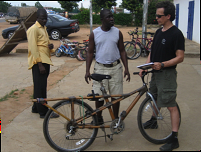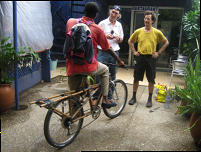Erstellt am: 22. 9. 2010 - 15:48 Uhr
Bamboo Bikes
I used to live in Ghana, and if I conjure up my memories of its rural roads in my mind, I see dusty, pot-holed affairs.
The roads I know are cloaked in the sickly-sweet smell of diesel. They're sided by sand pathways where strings of strong-necked women dressed in colourful wraps walk slowly towards the markets with buckets of vegetables balanced on their heads.
But here’s a vision of the future: Those same country roads could be teaming with locals rolling along swiftly atop cheap but strong bamboo framed cargo bikes.
These would allow famers to get their goods to market much more quickly and allow families to get to schools and health clinics in a fraction of the time it would take to walk. Mobility could be massively improved without an increase in pollution (or carbon emissions) and all for a minimum price by the mass production of what can only be described as an organic bike.

bamboo bike project
That at least is the utopian hopes of the Bamboo Bike Project - an initiative created scientists and engineers at the Earth Institute at Colombia University in the USA.
“Anything that helps mobilize people, will vastly improve the Ghanaians lives,” says project leader John Mutter.
And so much the better if that means of transportation is sustainable and clean. So Mutter and his colleagues are trying to create a locally staffed workshop in Ghana mass producing cheap bamboo framed cargo bikes for the local population.
Mutter says that bamboo is the perfect material for bike manufacture because it is light but incredible strong – stronger than steel or aluminum in fact. It is fibrous and flexible, it thrives in the wet, and it comes ready grown in hollow stalks of varying diameters which can be used for different parts of the frame.
Bamboo is of course not native to Africa, it originates from Asia, but it can grow abundantly and quickly under the African sun. The work-shop grow the raw materials right on their doorstep and see their supplies quickly replenishing themselves - after all bamboo is the fastest growing woody plant in the world.
22nd of September is World Car Free Day
To make the bikes, the workers take the 3 year old bamboo, dry it and cure it (to protect it against weevils) and then fit the frames together without the use of power tools. John Mutter says this is a massive advantage since it “avoids all the negative impacts of welding not to mention the prohibitive cost of the welder.”
The scientists and engineers maybe based in the USA but the production facility will be run and maintained by Ghanaians. Mutter’s colleague David Ho, a cycle-mad New Yorker, says the Bamboo Bike Project created a system by which these bikes “can be produced in local conditions in Africa with local directions and local labor.” A production facility has been leased and agreements have been reached to harvest local bamboo.

bamboo bike project
You can already get deluxe bamboo bikes from boutiques on both coasts of the USA, costing up to 10,000 dollars each. These Ghanaian bikes will distant cousins of those luxury cruisers! John knows his competition in Ghana – the ubiquitous low-quality two-wheelers that have been mass imported from China. He says his team could make a more expensive bike that would be much better than the Chinese clunkers but that “people won’t buy a bike that is demonstratively better because they don’t have demonstratively more money.”
So the team has to aim at producing a bike in the same price range. The bamboo bike of Ghana will be a functional load-bearing commute, nothing fancy, but John Mutter is proud of his prototype.
Here more on the daily Reality Check Podcast
Aware of the limitations of radio broadcasting, John calls out to me as I say good-bye: “Don’t forget to tell people they look good!”
Ah the joys of a web-site! Just keep them away from pandas.


